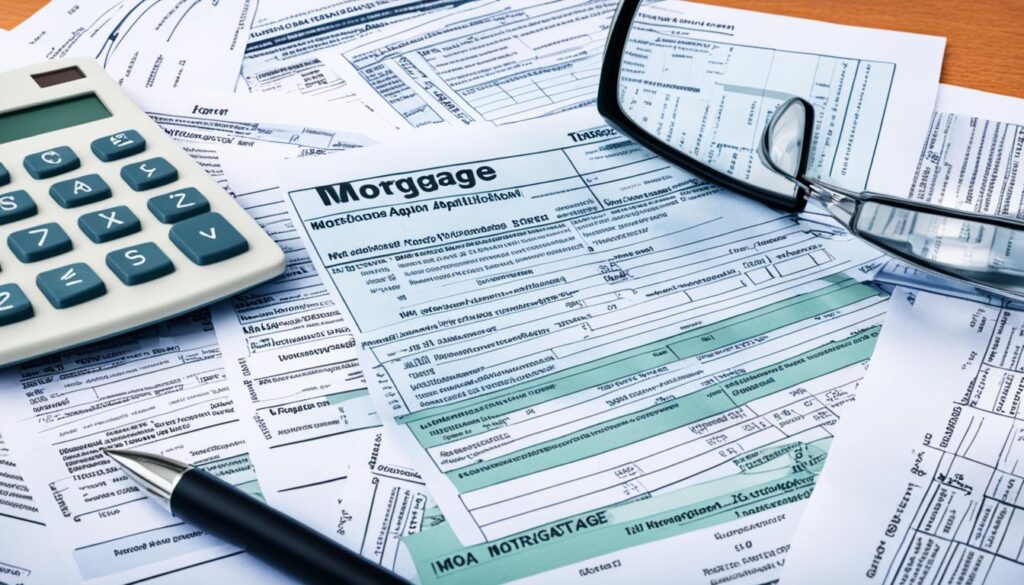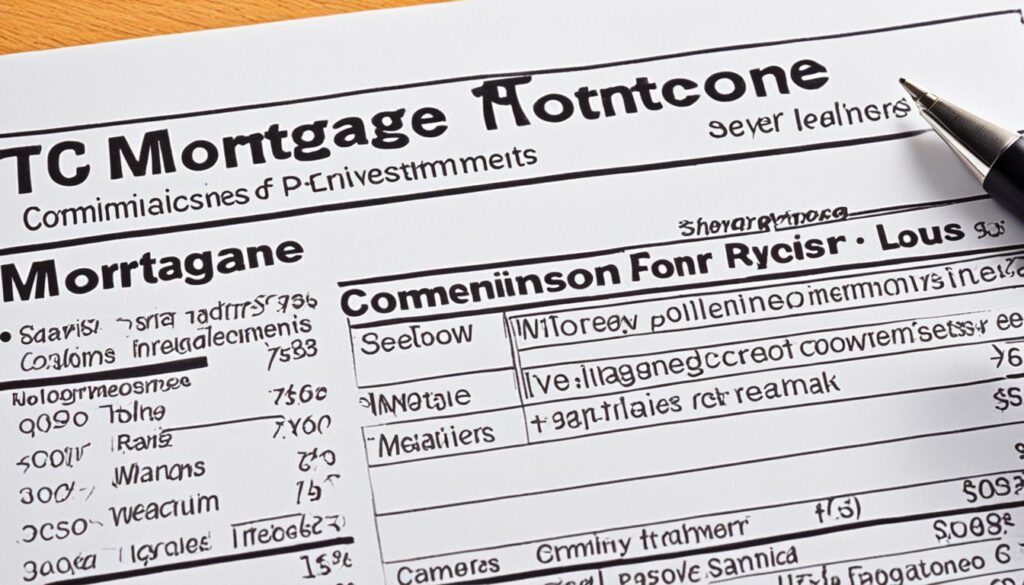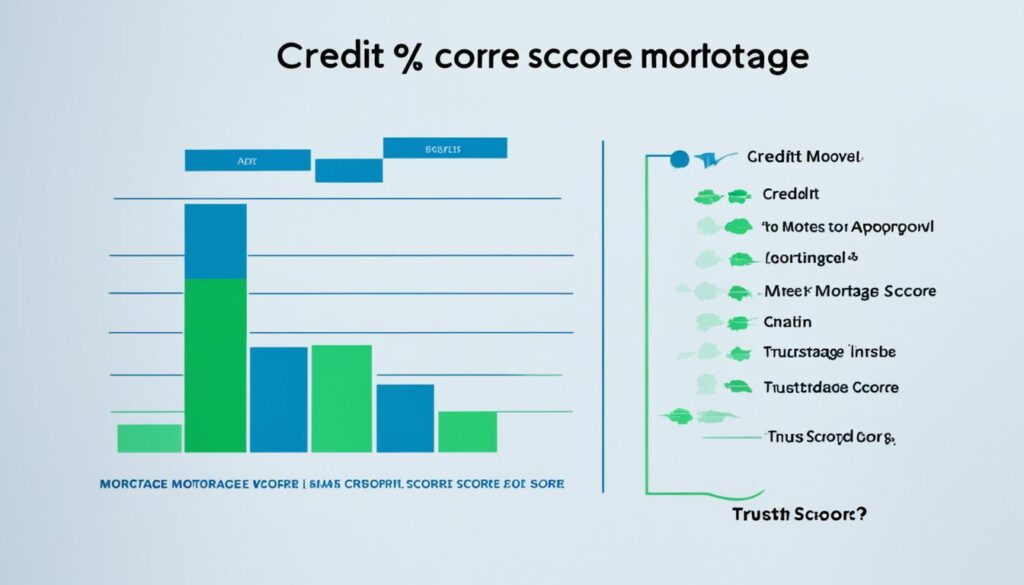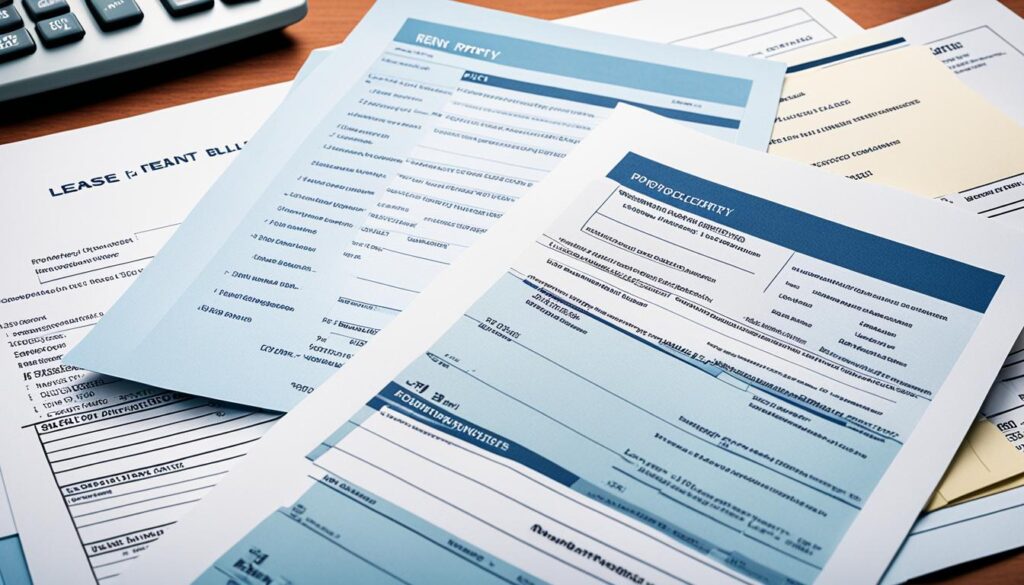Getting a mortgage loan is a big step in your financial life. Lenders need many documents to check if you can handle the loan. These include tax returns, proof of income, and credit reports. They are key to the loan application process.
Knowing what documents you need can make applying for a mortgage easier. This guide will walk you through the main documents you’ll need. It will help you prepare for a successful mortgage application.
Key Takeaways
- Mortgage lenders need various financial documents to see if you’re a good candidate for a loan.
- These documents are things like tax returns, pay stubs, W-2 forms, bank statements, credit reports, and proof of income.
- Having these documents ready can make applying for a mortgage smoother and boost your chances of getting approved.
- The exact documents you need may change based on your financial situation and the mortgage type you want.
- Keeping your financial records organized can make the paperwork part easier and less stressful.
Introduction to Mortgage Loan Documentation
When you apply for a mortgage loan, you need to give lenders financial documents. These documents prove you can pay back the loan. They look at your income, assets, debts, and credit history. This helps lenders decide if you’re eligible for a mortgage and which loan program fits you best.
Getting your mortgage paperwork ready early makes the process smoother. Lenders want to see things like tax returns, pay stubs, bank statements, and credit reports. This helps them check if you meet the home loan requirements.
Having these mortgage loan documentation ready can speed up the underwriting process. It also shows you’re serious about getting a loan. Being organized and proactive shows you can handle the mortgage application process.
“The key to a seamless mortgage experience is being prepared with the right documentation from the start.”
Knowing how important mortgage loan documentation is helps you prepare better. This makes the mortgage application process easier and less stressful.
Tax Returns and Income Verification

Lenders often ask for mortgage applicants’ tax returns as part of verifying income. These documents show the applicant’s financial situation. They include total income, income sources, and deductions or credits that affect loan repayment ability.
Tax Returns
Lenders usually want the last two years of tax returns. This helps them see if the applicant’s income is steady over time. Tax returns list the applicant’s earnings, including self-employment, investment, or other income .
Pay Stubs and W-2 Forms
Lenders also want the applicant’s latest pay stubs and W-2 forms. These confirm the applicant’s current income and job status. They make sure the reported earnings match the mortgage application.
The mix of tax returns, pay stubs, and W-2 forms gives lenders a full view of the applicant’s finances. This is key to seeing if they can pay back the mortgage loan.
“Lenders use tax returns, pay stubs, and W-2 forms to verify an applicant’s income verification for mortgage and ensure their ability to repay the loan.”
Proof of Income Sources

When you apply for a mortgage, you need to show more than just your total income. Lenders want to know where that income comes from. This helps them understand if you can reliably pay back the loan.
Employment Income
If you have a job, you’ll need to provide certain documents. These include W-2 forms, pay stubs, and verification from your employer. They show your salary, wages, and any extra money you might get.
Self-Employment Income
If you work for yourself, you’ll need to give more proof. Lenders want to see your business tax returns from the last two years, profit and loss statements, and a current balance sheet. This helps them check if your self-employment income is steady and strong.
By checking your income from different places, lenders can make better decisions. They make sure you have enough money to pay your mortgage.
| Income Source | Documentation Required |
|---|---|
| Employment Income |
|
| Self-Employment Income |
|
“Lenders need to see a clear and consistent picture of an applicant’s income sources to make an informed decision about their mortgage application.”
Bank Statements and Asset Documentation
When you apply for a mortgage, you’ll need to give the lender your bank statements. They check these to make sure you have enough money for a down payment, closing costs, and mortgage reserves. Bank statements for the last two to three months are usually needed. They must show a steady balance. If you have big deposits or withdrawals, you’ll need to explain them.
Lenders also want to see your investment accounts, retirement funds, and other assets you’ll use for buying a home. This asset documentation helps the lender understand your finances and if you can meet the mortgage needs.
The lender checks your mortgage down payment funds and mortgage reserves to see if you have enough for upfront costs and to stay financially stable during the loan. By looking at your bank statements and asset documents, the lender can decide if you’re eligible for a mortgage.
“Providing accurate and comprehensive bank statements and asset documentation is crucial for securing a mortgage loan.”
Being open and quick to provide the needed financial documents can make applying for a mortgage easier. It also increases your chances of getting the loan you need to own a home.
Credit Reports and Credit Scores

When applying for a mortgage, lenders look closely at an applicant’s credit reports and credit scores. These factors are key in deciding if someone is creditworthy. They help figure out what loan an applicant can get and the interest rate they’ll pay.
Lenders want a minimum credit score of 620 for regular mortgage loans. But, FHA and VA loans might accept lower scores. A high credit score can lead to better loan terms. A low score might mean higher interest rates or even denial of the loan.
Lenders check an applicant’s credit history by looking at reports from Experian, Equifax, and TransUnion. These credit reports show the applicant’s borrowing and payment history. They include info on credit card balances, loan payments, and any negative marks like late payments or collections.
| Mortgage Loan Type | Minimum Credit Score |
|---|---|
| Conventional Loan | 620 |
| FHA Loan | 580 |
| VA Loan | 580 |
Having a strong credit history and credit score is key for getting the best mortgage terms. Knowing how credit reports and credit scores affect mortgage applications helps applicants improve their finances. This can boost their chances of getting approved for a mortgage.
Gift Letters for Down Payment Funds

Many buyers use gifts from friends or family for down payments on homes. Lenders need a gift letter to check the funds’ source. This letter is key to the mortgage process.
A mortgage gift letter should have certain details:
- The name, address, and phone number of the person giving the gift
- The relationship between the giver and the buyer
- The gift’s amount
- A statement that the funds are a gift and don’t need to be paid back
This info proves the down payment isn’t a loan. It shows it’s a true gift. This is important for the buyer’s mortgage approval.
Using gift letters for mortgage and down payment gift funds helps buyers with upfront costs. By meeting the requirements, buyers can get mortgage down payment assistance. This helps them reach their dream of owning a home.
| Required Gift Letter Information | Purpose |
|---|---|
| Donor’s name, address, and phone number | Verifies the identity and contact information of the gift donor |
| Relationship to the mortgage applicant | Establishes the nature of the relationship between the donor and the borrower |
| Amount of the gift | Specifies the exact amount of the down payment gift funds |
| Statement that the funds are a gift and do not need to be repaid | Confirms that the funds are not a loan and do not need to be paid back |
“Utilizing gift letters for mortgage and down payment gift funds can be a valuable strategy for homebuyers who need assistance with the upfront costs of purchasing a home.”
Photo Identification
When you apply for a mortgage, you’ll need a valid photo ID. This is key for the mortgage process. It helps protect against fraud and meets Anti-Money Laundering (AML) and Know Your Customer (KYC) rules.
Driver’s licenses and passports are often accepted as photo IDs for mortgages. They check your identity and make sure your mortgage application info matches your ID. This is important to show you’re a trustworthy borrower.
Having a photo ID for mortgage or mortgage application identification proves you’re who you say you are. It makes the lending process safer and smoother. By showing a valid ID, you show you’re serious about the loan and gain the lender’s trust.
“Proper identification is the cornerstone of a successful mortgage application. It’s not just about meeting the lender’s requirements, but also about establishing a foundation of trust and transparency in the process.”
In short, showing a photo ID for your mortgage application is vital. It confirms your identity, follows the rules, and builds trust. With a valid ID, you make your mortgage application process secure and smooth.
Rental History Documentation

If you’re buying a home for the first time, you might need to show your rental history. You can do this by giving lenders copies of canceled rent checks or getting a verification from your landlord. This shows you’ve been paying your rent on time. Lenders look at this to see if you can handle monthly payments, which is key for getting a mortgage.
Canceled Rent Checks
Showing canceled rent checks proves you’ve paid your rent on time. Lenders check this to see if you’re good with money and can manage your monthly bills. This is important for getting a mortgage loan.
Landlord Verification
Lenders might also ask for a landlord verification to check your rental history. Your landlord can give this document. It shows how long you rented, your rental payments, and if you paid on time.
This landlord verification is another way for lenders to see if you’re good with money. It helps them understand if you can handle the costs of owning a home.
| Document | Purpose |
|---|---|
| Canceled Rent Checks | Demonstrate consistent, timely rental payments |
| Landlord Verification | Corroborate the applicant’s rental history and payment record |
By showing these rental history documents, you can make your mortgage application stronger. This proves you can handle monthly costs, which is important for lenders.
Mortgage Loan
The mortgage loan is key to buying a home. Lenders look at the documents you give them to see if you’re eligible. They check your income, assets, credit history, and more to see if you can pay back the loan.
After getting all the mortgage loan documentation, lenders give you a Loan Estimate. This shows the loan’s terms, like the interest rate, monthly payments, and closing costs. It helps you understand what you’ll owe.
| Mortgage Loan Application Requirements | Mortgage Loan Process |
|---|---|
|
|
By giving the needed mortgage loan documentation, you make the mortgage loan application and mortgage loan process smoother. This helps make buying a home go smoothly.
Additional Documents Based on Circumstances
When you apply for a mortgage, you might need more documents than usual. These can depend on your situation, like being divorced or having student loans.
Divorce Decrees
If you’re divorced, you’ll likely need to show a copy of your divorce decree. This proves details like alimony or child support payments. These payments are key in seeing if you can afford the mortgage.
Student Loan Information
If you still have student loans, you’ll need to share details about them. This includes the loan balance, how much you pay each month, and when you’ll pay it off. This info helps the lender figure out your debt-to-income ratio. It’s important for deciding if you can get the mortgage.
Knowing you might need divorce documents for mortgage and student loans for mortgage helps you prepare. Being ready with the additional mortgage documentation can make applying for a mortgage easier. It also boosts your chances of getting the loan.
Also Read: What Are Construction Loans And How Do They Work?
Conclusion
The mortgage application process needs a good understanding of what documents are needed. Homebuyers must be ready to provide many documents, like tax returns and credit reports. Knowing what you need helps make the home buying process smoother and boosts your chance of getting the loan.
Having all your documents ready can really help with your mortgage application. It shows you’re financially responsible and can pay back the loan. By getting the mortgage loan checklist and organizing your home buying documentation, you’ll feel more confident and in control.
Getting all the documents together shows you’re serious and financially ready to buy a home. This helps you move closer to owning your dream home and securing your financial future.
FAQs
Q: What documents do I need for a mortgage loan?
A: The documents needed for a mortgage loan typically include proof of income, tax returns, bank statements, identification documents, and details about any debts you may have.
Q: How can a mortgage calculator help me?
A: A mortgage calculator can help you estimate your monthly mortgage payments based on factors like loan amount, interest rate, and loan term.
Q: What is the difference between a fixed-rate and adjustable-rate mortgage?
A: A fixed-rate mortgage has a constant interest rate throughout the life of the loan, while an adjustable-rate mortgage’s interest rate can change periodically based on market conditions.
Q: Do I need mortgage insurance?
A: Depending on your down payment amount and loan type, you may be required to have mortgage insurance to protect the lender in case of default.
Q: How do I compare mortgage options?
A: You can compare mortgage options by looking at factors such as interest rates, loan terms, fees, and the total cost of the loan over time.
Q: What is the role of a mortgage broker?
A: A mortgage broker is a middleman between borrowers and lenders, helping you find loan options from different lenders and guiding you through the mortgage process.
Q: How can I lower my interest rate on a mortgage?
A: You can potentially lower your interest rate by improving your credit score, reducing your debt-to-income ratio, making a larger down payment, or choosing a shorter loan term.
Source Links
- https://www.waterstonemortgage.com/blog/mortgage-basics/2020/03/home-loan-documents
- https://www.creditkarma.com/home-loans/i/home-loan-documents
- https://www.chase.com/personal/mortgage/education/financing-a-home/mortgage-application